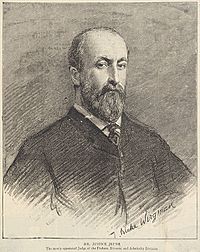Francis Jeune, 1st Baron St Helier facts for kids
Quick facts for kids
The Lord St Helier
|
|
|---|---|

Lord St Helier.
|
|
| President of the Probate, Divorce and Admiralty Division | |
| In office 2 June 1892 – 30 January 1905 |
|
| Preceded by | Sir Charles Butt |
| Succeeded by | Sir Gorell Barnes |
| Judge Advocate General | |
| In office 31 December 1892 – 1905 |
|
| Prime Minister | William Ewart Gladstone The Earl of Rosebery |
| Preceded by | William Thackeray Marriott |
| Succeeded by | - |
| Personal details | |
| Born | 17 March 1843 |
| Died | 9 April 1905 (aged 62) |
| Nationality | British |
| Spouses | Susan Stuart-Mackenzie (d. 1931) |
| Alma mater | Balliol College, Oxford |
Francis Henry Jeune, 1st Baron St Helier (born 17 March 1843 – died 9 April 1905) was an important British judge. He was also known as Sir Francis Jeune for many years. He held two very important jobs at the same time. From 1892 to 1905, he was the President of a special court called the Probate, Divorce and Admiralty Division. He was also the Judge Advocate General during those years. Some experts believe he had a huge impact on how admiralty law (laws about the sea and ships) developed in Britain.
Contents
Early Life and School
Francis Henry Jeune was the son of Francis Jeune, who was a Bishop. A bishop is a high-ranking leader in the Christian church. His mother was Margaret Symons.
Education and Oxford
Francis went to a famous school called Harrow. After that, he studied at Balliol College, Oxford, which is part of Oxford University. While he was at Oxford, he became the President of the Oxford Union in 1864. The Oxford Union is a famous debating society where students practice public speaking.
During his time there, students discussed what to do about some old paintings in the debating room. These paintings were done by artists linked to the Pre-Raphaelites. Francis Jeune thought the paintings were "hideous" and didn't care what happened to them. In 1868, he officially became a lawyer, which is called being "called to the Bar" in the UK.
Becoming a Judge
Francis Jeune's career in law grew steadily. In 1888, he became a Queen's Counsel. This is a special title given to experienced lawyers. It means they are recognized as top legal experts.
Key Judicial Roles
In 1891, he was made a judge in the Probate, Divorce and Admiralty Division of the High Court. At this time, he was also given the title of "Sir." In June 1892, he became the President of this court. He took over from Sir Charles Parker Butt. He also joined the Privy Council, a group of advisors to the King or Queen.
Later that year, in December, he was also appointed Judge Advocate General. This job involves advising on military law. The Prime Minister at the time, William Ewart Gladstone, chose him for this role.
Later Career and Honors
Francis Jeune continued to be the President of the Probate, Divorce and Admiralty Division until January 1905. He had to resign because he was not well. In 1897, he was made a Knight Commander of the Order of the Bath (KCB). This is a high honor from the British monarch. Five years later, he received an even higher honor. He was promoted to a Knight Grand Cross of the order (GCB) in 1902. King Edward VII personally gave him this award at Buckingham Palace.
In February 1905, he was given a special payment for his service. He was also made a Baron, which is a title of nobility. He became Baron St Helier. This title was named after St Helier in Jersey and Arlington Manor in Berkshire.
His Family Life
Lord St Helier married Susan Mary Elizabeth Stanley on 17 August 1881. Susan was a widow, meaning her first husband had passed away. She was the daughter of Keith William Stewart-Mackenzie.
A Sad Loss
In 1882, Lord St Helier and Susan had their only child together, a son named Francis Jeune. Sadly, their son died on 19 August 1904, in Poona, India, from an illness.
Lord St Helier himself passed away the next year, on 9 April 1905, when he was 62 years old. Because he had no other sons who survived him, his title of Baron St Helier ended with him. His wife, Lady St Helier, continued to live until 1931. She also received an honor, becoming a Dame Commander of the Order of the British Empire in 1925.
Works
- The Mahometan Power in India - 1867

